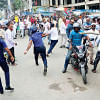The constitutionality of building kitchen markets over bulldozed homes

The Dhaka South City Corporation (DSCC) recently went on to evict 87 families in the Miranzilla sweeper colony. One DSCC official told this daily that the eviction measures were being carried out to implement a decision made some eight years ago.
As a law student and an academic, I am still naïve to recall judicial interpretations of our constitution and laws. Indeed, more than two decades back, the High Court categorically observed that no eviction is constitutional if alternative rehabilitative measures are not adopted (ASK v Bangladesh, 1999). Later, there were multiple other decisions along the same line of interpretation, landmark among which is BLAST v Bangladesh (2008).
Shelter, among others, is not a judicially enforceable right under the Bangladesh Constitution. It falls within the purview of the judicially unenforceable policy principles that nonetheless are supposed to be "fundamental to the governance of Bangladesh" and to "form the basis of the work of the state." However, the Supreme Court has gone on to enforce shelter through reimagining the margins of the fundamental right to life. Indeed, the court held that the right to life, as enshrined in the constitution, cannot be construed as a vegetative existence only, but ought to be interpreted as a dignified life.
The decisions mentioned above constitute the primer for constitutional law lessons 101. These are rather primary cases for understanding and teaching right to life in law schools (at least I can speak for the University of Dhaka). The Dalit, on the other hand, are a major category to study and research into equality and non-discrimination law.They are the paradigmatic subaltern class about whom discussions abound in civil society seminars and symposia. What the Miranzilla eviction measures underscore for us afresh is the gap between our studies, activism, and reality. It also shows how only the courts are sites of constitutionalism for us.
However, the discursive notion of constitutionalism ought to be rooted in multifarious sites, including parliamentary and executive spaces of state governance, and the decisions emanating from the courts ought to be taken seriously by the decision-makers. Why should every (unconstitutional) action get remedially treated with stay orders from the court (as happened at the present instance as well), when we already have categorical observations and holdings from the court to pre-emptively inform the decisions of different branches of the state?
For purposes of international human rights law, adequate housing is a paradigmatic economic right having both cultural and social connotations. This right can be restricted only in accordance with law, and only in pursuance of a legitimate aim. In the case of Miranzilla, such aim is the expansion of a kitchen market. Tenets of human rights law require that the restriction and the legitimate aim are proportionate to each other, and that such restriction is the least intrusive measure in pursuance of the aim sought to be achieved. Further, in no case can such restriction violate the "essence" of the right, implying that there has to be alternative rehabilitative measures in place to counteract the impact of restrictions, if any, imposed on the exercise of right to adequate housing. The international human rights law envisions that the right is progressively realised, also firmly acknowledging that in no cases can states take regressive measures (e.g., eviction without appropriate and adequate rehabilitation).
Rehabilitation, too, is rather euphemistic, I would say. Indeed, eviction from ancestral homes of hundred years strikes at the very root of a community's existence, and rehabilitation can hardly restore the status quo ante. The fact that we advocate for rehabilitation as a minimum for the would-be evicted people too in a way empowers the top-down narrative defined by hegemony. Nonetheless, when even the bare minimum is not complied with, we get to see the unclad face of power.
The recent eviction measures tell us two things: first, how the Dalit community lies at the lowest stratum of the power hierarchy, and second, that those in decision-making power view them exactly as such. The decision-makers also are entirely unmindful to the existence of elderly, children, and persons with disabilities within such families. The disparate impact that the measures are having on them is unsurprisingly not accounted for.
The Dalit, the identity they embrace "as a matter of assertive pride and resistance"—are indeed the outliers, falling outside the four-fold caste schema. The eviction reifies their identity as Dalits—as opposed to "children of God" or Harijans, as Gandhi had called them—a term that I personally find rather supercilious and patronising (as did Ambedkar). In any case, can homes of the children of God be bulldozed to expand a kitchen market?
Psymhe Wadud teaches international human rights law at the University of Dhaka and is in-charge of Law & Our Rights at The Daily Star.
Views expressed in this article are the author's own.
Follow The Daily Star Opinion on Facebook for the latest opinions, commentaries and analyses by experts and professionals. To contribute your article or letter to The Daily Star Opinion, see our guidelines for submission.

 For all latest news, follow The Daily Star's Google News channel.
For all latest news, follow The Daily Star's Google News channel. 











Comments